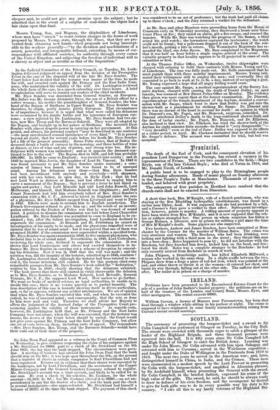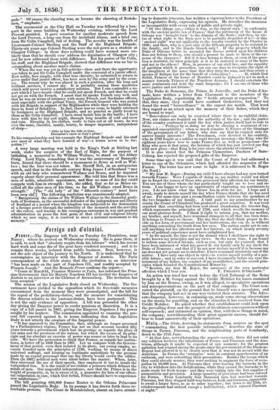SCOTLAND.
The ceremony of presenting the burgess-ticket and a sword to Sir Colin Campbell was performed at Glasgow on Tuesday, in the City Hall. The streets were crowded with thousands eager to catch a glimpse of the leader of the Highland Brigade, and three thousand persons were squeezed into the -h . It is fifty years since Sir Colin Campbell left the High School of Glasgow to enter the British Army. Learning war under Sir John Moore, Sir Colin advanced with him upon Sahagun and retreated with him to Corunna; served in the Walcheren expedition ; and fought under the Duke of Wellington in the Peninsula from 1810 to 1813. The next two rears he served in the American war; and, later, distinguished himself in China, in India, and the Crimea. These facts were enumerated in a modest speech by the Lord Provost in presenting Sir Colin with the burgess-ticket, and amplified in .Alisonian phrases, by Sir Archibald himself, when presenting the General with the sword. Sir Colin Campbell, in the briefest fashion, expressed his sense of the high value of the gifts. The sword, he said, he should be always ready to draw in defence of his civic freedom, and the recompense he desired to give for both gifts was to do in every possible way his duty to his country. "I owe all this to my hardy veterans of the Highland Bri-
men, "emphatic."
gade." Of course the cheering was, as became the cheering of Scotch-
The ceremonial at the City Hall on Tuesday was followed by a ban- quet in the same building on Wednesday evening, whereat the Lord Provost presided. It gave occasion for another moderate speech from the Lord Provost, a long one from Sir Archibald Alison, and a brief one from Sir Colin Campbell, full of feeling. The novelty was the health of Lieutenant-Colonel Sterling and the Staff of the Highland Brigade. Thirty-six years ago Colonel Sterling wore the red gown as a student at Glasgow College: in those days nothing could have seemed more un- likely than that he should ever address the dignitaries of Glasgow city ; and he now addressed them with diffidence. But his praise of Sir Colin, his staff, and the Highland Brigade, showed that diffidence was no bar to outspeaking about another man's claims.
"When the war was yet in full activity—then and there the opportunity was taken to put Sir Colin Campbell under the command of a Muer officer. How nobly, how simply, with what true chivalry, lie submitted to return to serve under that jumor officer, has been seen by the army and by the coun- try. The reason why he was placed in such a position, after his long and brilliant services, I cannot say. It is probably among those mysteries which will never receive a satisfactory solution. But I can contradict a re- port which I have heard—that he could not speak French, and that he could not get on with the French. I assert that he speaks French very well, and that he was on terms of intimacy with many French and Sardinian officers, most especially with the gallant Viney, the French General who was posted with his Brigade in support of the Highlanders while they were holding the lines in front of Balaklava. In fact, there was no corps so highly esteemed by foreigners as the Highland Brigade and no general so justly loved by them as Sir Colin Campbell. I have stood beside him in the battle ; I have been with him by day and night, through long months of cold and snow and rain. Sleeping in his clothes ready to turn out at all hours, he was ever the same, cheerful, manly, hearty, to danger impassive, independent of sleep- ' Alike to him the tide or time,
December's snow or July's prime.'
To his companionship and his example the Highland Brigade and his staff owe most of what they have learned of war—a lesson never to be for- gotten !"
A very large meeting was held in the King's Park at Stirling last week, under the auspices of the Earl of Elgin, for the purpose of initiating a memorial to Sir William Wallace, to stand on the Abbey Craig. 'Lord Elgin, remarking that it was the anniversary of Bannock- burn, hinted that there should be a monument to Bruce as well as Wal- lace; but the hint was not taken. Mr. Sheriff Bell, in an antiquarian speech, said that in the fifteenth century James I of Scotland "met with an old lady who remembered Wallace e and Bruce, and he inquired eagerly about their personal appearance. She told him that Bruce was a man of noble, admirable appearance, and that no man of his day could compete with him in strength : but, she added, that so far as Bruce ex- celled all the other men of his time' so far did Wallace excel Bruce in strength." [The "old lady" of the "fifteenth century" must have been very oldl] The following resolution was unanimously adopted. "Recognizing the claims of Sir William Wallace to the immortal grati- tude of Scotsmen, as the successful defender of the independence and liberty of Scotland at a period when the kingdom was subject.a, to the domination ef a foreign power through the imbecility of the monarch and the servility of the rulers, and tracing to his courageous enterprise in war and prudent administration in peace the first germ of that civil and religious liberty which we now enjoy, it is resolved to erect a national monument to his Memory."



































 Previous page
Previous page